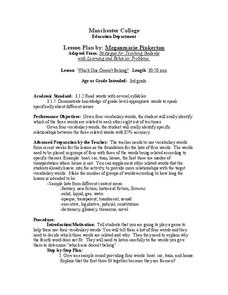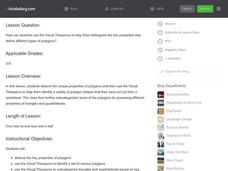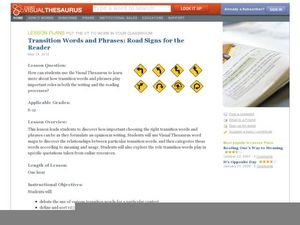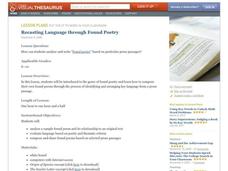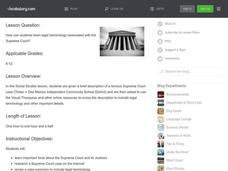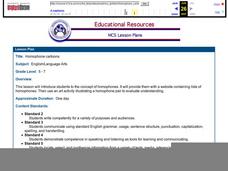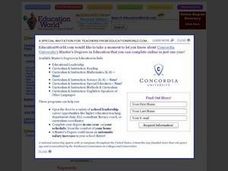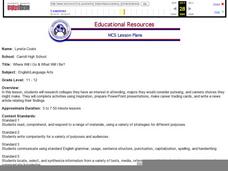Curated OER
Rooting One's Way To Meaning
Students use a thesaurus on the internet to explore the meanings of Greek and Latin roots. They find definitions of given words, draw a concept map for root words, and write four synonyms for each word. Students discover how Latin and...
Curated OER
Which One Doesn't Belong?
Third graders identify words that are related with 80% accuracy. Given a list of four vocabulary words, 3rd graders identify specific relationships between three of the four words. They also identify which of the four words are not...
Curated OER
Parts of Speech: Active Verbs
Students use White Fang to help them study active verbs. For this grammar lesson, students define active verbs and find examples in the the novel White Fang. Students then use ProQuest to research a place they'd like to visit. Students...
Curated OER
Descriptive Drawings - Pen and Ink - Art with Text
Students create a pen and ink drawing using words to determine values choosing a work with high emotional content and incorporating words that describe the picture's content placing words together tighter, made bolder, etc. to achieve...
Curated OER
Can You Find It?
Fourth graders discover how to do an Internet search. They reviewi traditional rescources used to find answers in the classroom and are introduced to electronic sources. They discuss terminology for navigating the Internet using the...
Curated OER
Letter from the Chateau
Students write a friendly letter based on their observations of a painting by Poussin.
Curated OER
Writing About Feelings
Students use four photos of themselves or draw four pictures of themselves, each showing a different feeling.
Curated OER
Spanish-English Cognates in the ELL Classroom: Friends or Foes?
Define the meaning of a cognate and use the concept to help Spanish-speaking ELLs connect their first language to English. Middle schoolers explore Latin roots to find cognates in both languages. They relate the Spanish and English word...
Curated OER
Mad-Libbing Your Way Into Modern Poetry
Use a Mad-Libs like activity to create modern poetry! Writers will identify different words and their parts of speech and study "The Red Wheelbarrow" by Williams Carlos Williams. Then, use the sheets attached to craft your own poem! An...
Curated OER
Know Your Polygons!
Young scholars identify and categorize different polygons. In this polygons lesson plan, students research and identify properties of polygons, identify different polygon shapes, and categorize different triangles and quadrilaterals.
Curated OER
Transition Words and Phrases: Road Signs for the Reader
Therefore! However! Furthermore! Explore the power of transition words and phrases. Signal your readers by suggesting the relationship between different thoughts or points. Help them demonstrate an understanding of word relationships.
Curated OER
Words That Sell
Explore words, definitions, their connotations and associations with brand names. Middle and high schoolers identify words used in commercials and determine their effect upon the consumer population. They explore how meanings are...
Curated OER
Making an Argument: Effective use of Transition Words
Work on using transition words in context by prompting elementary and middle schoolers to write their own persuasive essays using transition words. They explore new forms of transition words and examine how they are used in an editorial...
Curated OER
The Power of Words in "Charlotte's Web"
Students analyze the text in Charlotte's Web. In this language arts lesson, students dissect the passages from Charlotte's Web, specifically the adjectives Charlotte used to describe Wilbur. Finally, students play a game using "word...
Curated OER
What's Your Genus? Scientific Classification and the VT
Young scholars understand the definition of binomial nomenclature. For this binomial nomenclature lesson, students classify ordinary animals by seeking their scientific names. Young scholars participate in a knowledge hunt using binomial...
Curated OER
Sorting Out Homophones in Roald Dahl's
Students explore the concept of homophones. In this homophone lesson, students use a selection from the book Matilda to review homophones. Students use a web to identify homophones.
Curated OER
Words That Hold Court
Students research legal terminology used in the Supreme Court. In this legal terminology lesson, students study a quote from President Obama about the Supreme Court. Students make a list of facts about the Supreme Court and the justices...
Curated OER
Recasting Language through Found Poetry
Discover the concept of found poetry in this engaging lesson. Secondary students will explore the poem "Natural Selection" and compare it to the writings of Charles Darwin in Origin of the Species. Students chose a text and create...
Curated OER
Words That Hold Court
Students recognize the importance of the Supreme Court. For this legal terminology lesson, students define a list of words to understand the Supreme Court and the language used in cases. Students revise a case summary.
Curated OER
Comprehending The Gettysburg Address
In this Gettysburg Address worksheet, students read passages from the Gettysburg Address, identify bold words, and answer short answer questions. Students complete 5 problems.
Curated OER
Homophone Cartoons
A terrific instructional activity on homophones awaits your youngsters. First, pupils access a website that contains lists of homophones. Then, it's time to get creative! Everyone gets a piece of poster board and they create a homophone...
Curated OER
"Me" Resource
Learners elucidate themselves by writing up to six entries in different formats. Some formatting choices include a dictionary, encyclopedia, or atlas entry, a magazine article, a newspaper article, and a table of contents. Some...
Curated OER
Where Will I Go and What Will I Be?
Help your future college graduates prepare for higher education with this series of lessons. High schoolers complete research projects about the colleges they would like to attend, and create PowerPoint presentations about their careers...
Curated OER
Arctic Writing
Fifth graders analyze photographs in order to write descriptively. In this descriptive writing lesson plan, 5th graders use the Internet to research and view photographs of the arctic. Students use descriptive language to...



